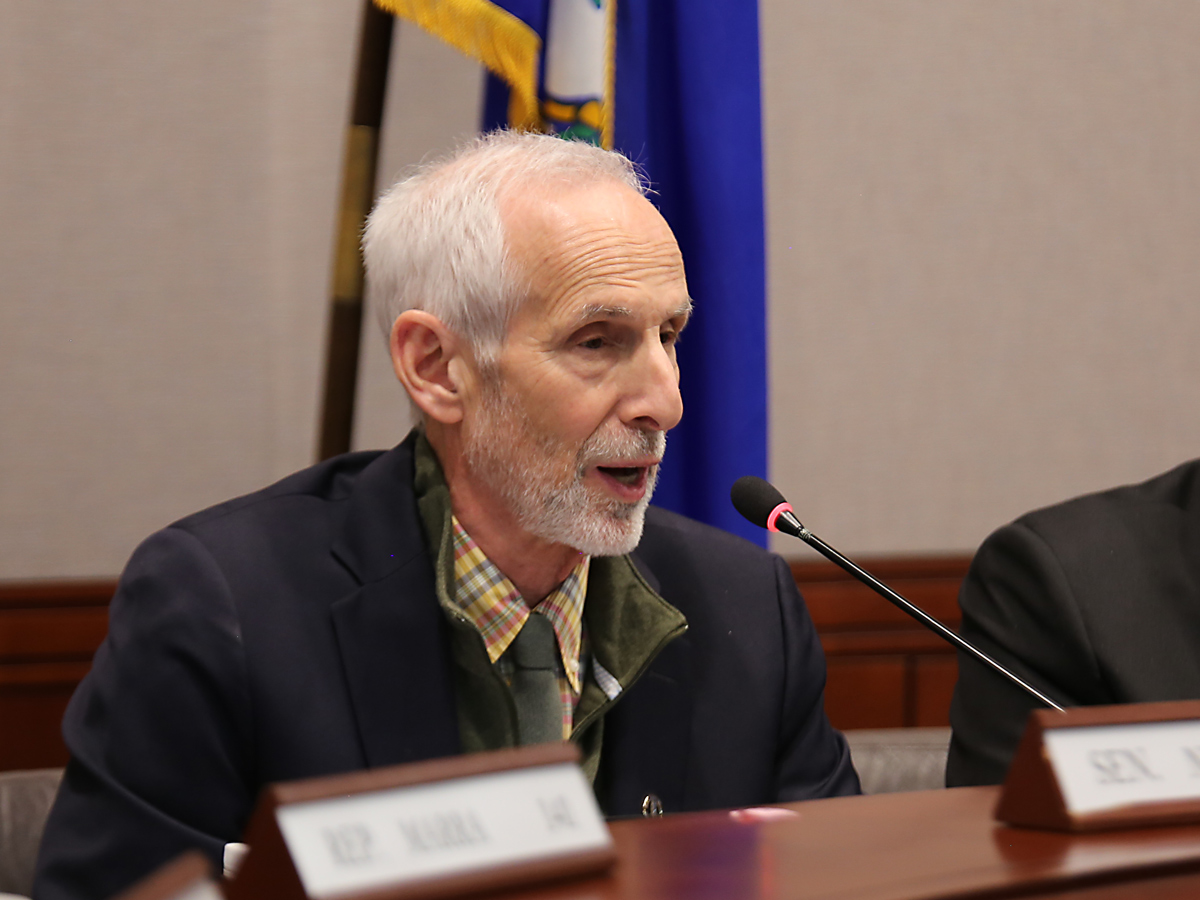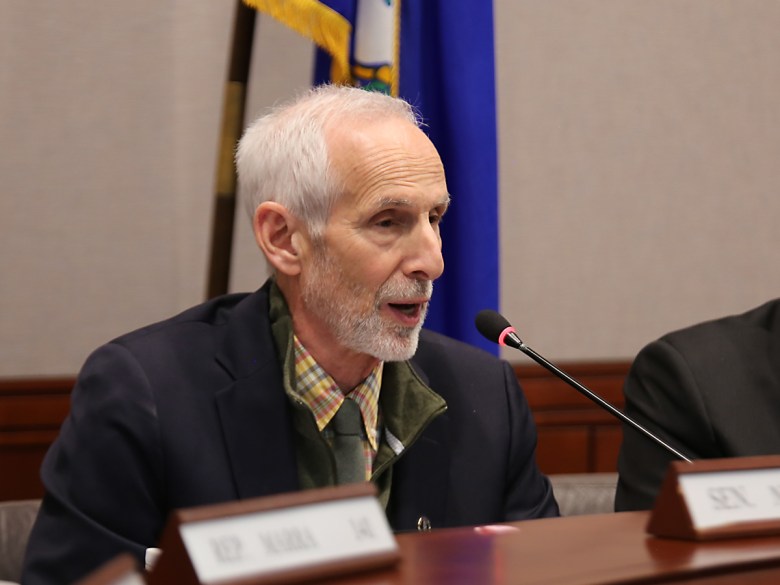 Sen. Norm Needleman, D-Essex, speaks to DEEP Commissioner Katie Dykes during a public hearing before the Energy and Technology Committee on Thursday, March 6, 2025, at the Legislative Office Building in Hartford. Credit: Doug Hardy / CTNewsJunkie
Sen. Norm Needleman, D-Essex, speaks to DEEP Commissioner Katie Dykes during a public hearing before the Energy and Technology Committee on Thursday, March 6, 2025, at the Legislative Office Building in Hartford. Credit: Doug Hardy / CTNewsJunkie
HARTFORD, CT – The Energy and Technology Committee debated two bills aimed at addressing Connecticut’s electricity costs this week in its final regularly scheduled meeting of the legislative session. The Republican proposal did not advance, but the committee voted to send the Democrats’ priority energy bill, Senate Bill 4, to the Senate floor.
 Sen. Ryan Fazio, R-Greenwich, speaks to DEEP Commissioner Katie Dykes during a public hearing before the Energy and Technology Committee on Thursday, March 6, 2025, at the Legislative Office Building in Hartford. Credit: Doug Hardy / CTNewsJunkie
Sen. Ryan Fazio, R-Greenwich, speaks to DEEP Commissioner Katie Dykes during a public hearing before the Energy and Technology Committee on Thursday, March 6, 2025, at the Legislative Office Building in Hartford. Credit: Doug Hardy / CTNewsJunkieThe Republican legislation, Senate Bill 647, titled “An Act Concerning Protections for Consumer Access to Affordable Electricity,” would have shifted the funding for certain energy programs – including renewable energy subsidies and energy-efficiency initiatives – from electricity bills to the state budget. Republican legislators contended that this change would provide immediate relief to ratepayers burdened by some of the highest electricity costs in the nation, while Democrats expressed concerns about the long-term consequences of such a shift.
The bill ultimately failed not by a direct vote on its merits, but through a procedural rejection. The committee first considered a motion to add SB 647 to the agenda for a final vote, which was introduced by Rep. Tracy Marra, R-Darien, and seconded by Sen. Ryan Fazio, R-Greenwich, the ranking members on the committee.
They argued that the bill had received over 750 pieces of public testimony in support and should be debated and voted on. The proposal included cutting public benefits charges from electricity bills, capping the price of power purchase agreements, and allowing nuclear and hydropower to compete with solar and wind.
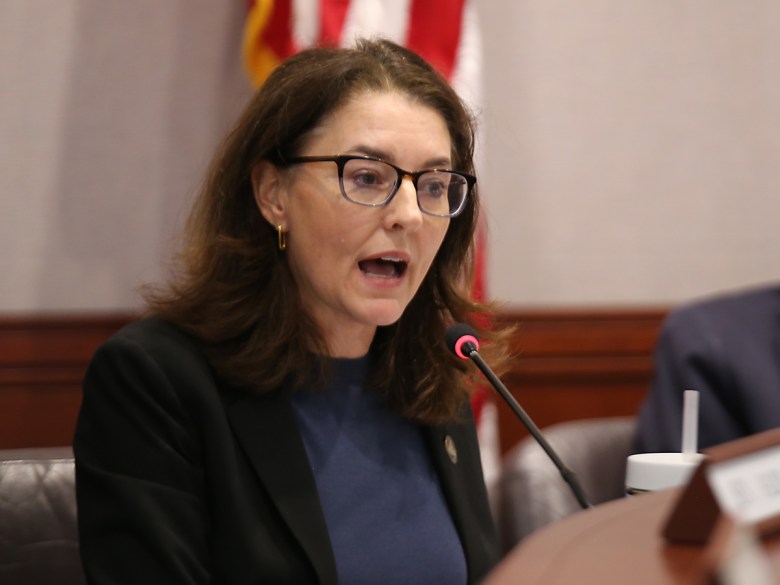 Rep. Tracy Marra, R-Darien, speaks to DEEP Commissioner Katie Dykes during a public hearing before the Energy and Technology Committee on Thursday, March 6, 2025, at the Legislative Office Building in Hartford. Credit: Doug Hardy / CTNewsJunkie
Rep. Tracy Marra, R-Darien, speaks to DEEP Commissioner Katie Dykes during a public hearing before the Energy and Technology Committee on Thursday, March 6, 2025, at the Legislative Office Building in Hartford. Credit: Doug Hardy / CTNewsJunkieHowever, Democratic legislators opposed adding SB 647 to the agenda. Rep. Jonathan Steinberg, D-Westport, co-chair of the committee, argued that “most of the in-person testimony we heard opposed this bill” and that many provisions were “non-starters.” He and other committee members warned that shifting renewable energy funding to the state budget could leave clean energy programs vulnerable to future budget cuts, potentially reducing funding for energy efficiency programs, workforce training, and home energy improvements.
Rep. Mary Mushinsky, D-Wallingford, emphasized the risks of such a shift, referencing past instances where similar funding changes led to money being diverted away from energy initiatives and toward general budget shortfalls.
“We’ve seen what happens when these funds move to the general fund – they disappear when there’s a budget shortfall,” she said.
Steinberg has been vocal about his opposition to moving those programs to the General Fund, suggesting during last week’s public hearing that the markets don’t like volatility, and the state’s General Fund is particularly volatile on its own.
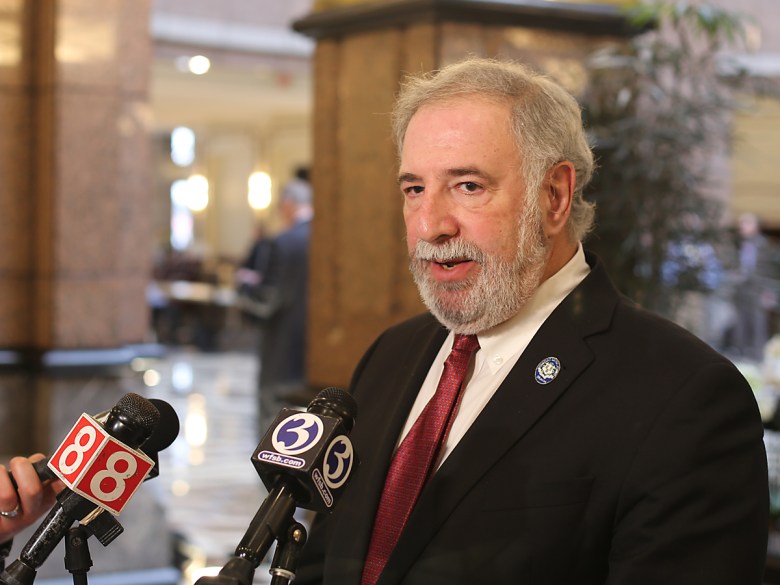 Rep. Jonathan Steinberg, D-Westport, speaks to reporters about the state’s energy policies on Thursday, March 6, 2025, at the Legislative Office Building in Hartford. Credit: Doug Hardy / CTNewsJunkie
Rep. Jonathan Steinberg, D-Westport, speaks to reporters about the state’s energy policies on Thursday, March 6, 2025, at the Legislative Office Building in Hartford. Credit: Doug Hardy / CTNewsJunkieA key provision in the bill, which would have allowed utilities to purchase cheaper renewable energy credits from out of state, also sparked debate. Currently, Connecticut requires utilities to purchase renewable energy credits at rates of $20 to $30 each, while out-of-state RECs can cost as little as $2 to $3. Republican legislators saw this as an opportunity to lower costs, but Democrats countered that it could weaken Connecticut’s renewable energy sector and lead to job losses.
Rep. Jaime Foster, D-Ellington, warned against oversimplifying energy reform.
“I will never promise my constituents a ‘silver bullet’ solution – press this button, pull this lever, make this vote, and you have a solution,” she said, adding that the proposal was fundamentally a cost shift rather than an actual reduction in energy expenses. “Fundamentally, what we’re discussing is either shifting costs from ratepayers directly onto taxpayers or cutting vital programs. Neither approach eliminates the fundamental expenses – they only change who pays.”
Following this debate, the committee took a roll call vote on the motion to add SB 647 to the agenda. The motion failed, effectively preventing the bill from advancing. Instead, Democratic legislators pointed to Senate Bill 4, a broader energy reform bill, as the main vehicle for energy policy changes this session. They suggested that some elements of SB 647 could be considered as part of SB 4 but declined to move SB 647 bill forward.
While SB 647 ultimately did not move forward, the committee did advance Senate Bill 4, which includes support for nuclear power and potential expansions to natural gas infrastructure. The Millstone nuclear plant in Waterford, which provides nearly half of the state’s electricity, was a focal point of discussion.
Sen. Norm Needleman, D-Essex, co-chair of the committee, emphasized the role of nuclear energy in the state’s energy strategy. “Nuclear is an essential bridge to renewable energy. It provides reliability and stability as we transition our grid,” he said, noting that large-scale electricity storage solutions for wind and solar power remain under development.
High electricity costs in Connecticut and throughout the northeast – ranking among the highest in the nation – were a central concern throughout the discussions. As of December, the state’s average residential electricity rate was 28.16 cents per kilowatt-hour, more than double the national average of 12.89 cents per kilowatt-hour. Lawmakers cited Connecticut’s reliance on imported natural gas, state-mandated renewable energy requirements, and aging grid infrastructure as contributing factors to the high costs.
Beyond SB 647, legislators debated HB 6927, which calls for a study on energy sources, and HB 7018, which would establish a technology pilot program. Some lawmakers questioned the necessity of another study, while others argued that proactive legislative action is needed to examine alternatives such as offshore wind, small modular nuclear reactors, and next-generation battery storage.
Connecticut’s ongoing negotiations with Canada over electricity imports were also discussed, with some legislators expressing concerns about trade tensions potentially impacting energy agreements.
“We are seeing instability in our energy partnerships, and we need to make sure we have reliable contracts in place to protect ratepayers,” Needleman said.
By rejecting the motion to bring SB 647 to a vote, the Energy and Technology Committee effectively killed the bill for this session, unless its provisions are revived in another form. The Democrats’ bill, SB 4, was forwarded to the Senate on a 17-8 vote and remains a vehicle for more discussions on energy policy and affordability.
The committee’s deadline to approve joint-favorable legislation is March 20.
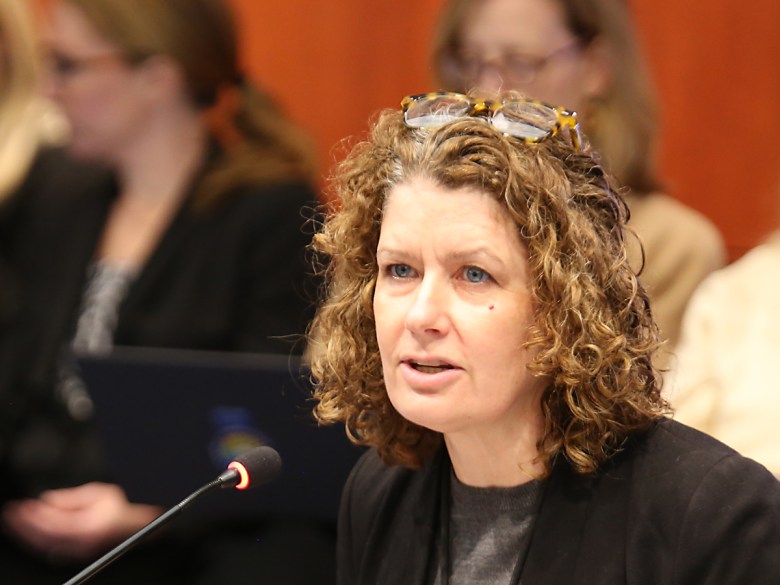 DEEP Commissioner Katie Dykes testifies before the Energy and Technology Committee during a public hearing on Thursday, March 6, 2025, at the Legislative Office Building in Hartford. Credit: Doug Hardy / CTNewsJunkie
DEEP Commissioner Katie Dykes testifies before the Energy and Technology Committee during a public hearing on Thursday, March 6, 2025, at the Legislative Office Building in Hartford. Credit: Doug Hardy / CTNewsJunkie
